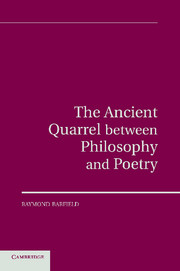Book contents
- Frontmatter
- Contents
- Acknowledgments
- Introduction
- 1 Socrates, Plato, and the Invention of the Ancient Quarrel
- 2 Aristotle, Poetry, and Ethics
- 3 Plotinus, Augustine, and Strange Sweetness
- 4 Boethius, Dionysius, and the Forms
- 5 Thomas and Some Thomists
- 6 Vico's New Science
- 7 Kant and His Students on the Genius of Nature
- 8 Hegel and the Owl of Minerva
- 9 Kierkegaard: A Poet, Alas
- 10 Dilthey: Poetry and the Escape from Metaphysics
- 11 Nietzsche, Heidegger, and the Saving Power of Poetry
- 12 Mikhail Bakhtin and Novelistic Consciousness
- Index
- References
10 - Dilthey: Poetry and the Escape from Metaphysics
Published online by Cambridge University Press: 03 May 2011
- Frontmatter
- Contents
- Acknowledgments
- Introduction
- 1 Socrates, Plato, and the Invention of the Ancient Quarrel
- 2 Aristotle, Poetry, and Ethics
- 3 Plotinus, Augustine, and Strange Sweetness
- 4 Boethius, Dionysius, and the Forms
- 5 Thomas and Some Thomists
- 6 Vico's New Science
- 7 Kant and His Students on the Genius of Nature
- 8 Hegel and the Owl of Minerva
- 9 Kierkegaard: A Poet, Alas
- 10 Dilthey: Poetry and the Escape from Metaphysics
- 11 Nietzsche, Heidegger, and the Saving Power of Poetry
- 12 Mikhail Bakhtin and Novelistic Consciousness
- Index
- References
Summary
In Plato's Republic, it was clear that establishing the relationship of poetry and philosophy was important. William Dilthey agrees. But Dilthey's conclusions differ considerably, and he embraces a near inversion of the Platonic view. Whereas for Plato the transcendent was most real, for Dilthey the transcendent in principle can play no role in philosophy; and in Dilthey's work, unlike in the Republic, poetry takes a preeminent place among the arts and, along with the other arts, is of critical importance to the work of philosophy: “It is one of the most vital tasks of contemporary philosophy to reestablish, through the further development of aesthetics, the natural relationship among art, criticism, and an engaged public.”
The content of both poetry and philosophy ranges across all of human experience. When one asks about the relationship of the two, no answer that does not attend to this common content will finally be satisfying. This may be especially true for Dilthey, for whom, some have argued, the entire conception of the human sciences is rooted in the conception of aesthetics. The efforts of poetry and, more broadly, of art in general aim at the understanding of human life. Indeed, Dilthey goes so far as to say, “None of us would possess more than a meager part of our present understanding of human conditions, if we had not become used to seeing through the poet's eyes.”
- Type
- Chapter
- Information
- The Ancient Quarrel Between Philosophy and Poetry , pp. 210 - 225Publisher: Cambridge University PressPrint publication year: 2011

